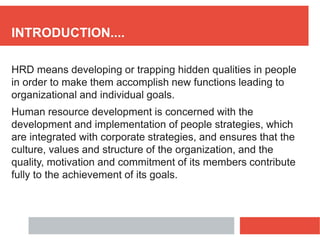Human Resource Development
- 1. HUMAN RESOURCE DEVELOPMENT Simaran Shaheen Asst. Prof. Ghanshyam Binani Academy of Management Sciences, Mirzapur
- 2. INTRODUCTION.... HRD means developing or trapping hidden qualities in people in order to make them accomplish new functions leading to organizational and individual goals. Human resource development is concerned with the development and implementation of people strategies, which are integrated with corporate strategies, and ensures that the culture, values and structure of the organization, and the quality, motivation and commitment of its members contribute fully to the achievement of its goals.
- 3. Human resource development is concerned with the development and implementation of people strategies, which are integrated with corporate strategies, and ensures that the culture, values and structure of the organization, and the quality, motivation and commitment of its members contribute fully to the achievement of its goals. HRD is a set of systematic and planned activities designed by an organization to provide its members with the necessary skills to meet current and future job demands. HRD is the process of increasing knowledge, skills,
- 4. Definitions of HRD HRD (Human Resources Development) has been defined by various scholars in various ways. Some of the important definitions of HRD (Human Resources Development) are as follows: According to Leonard Nadler, "Human resource development is a series of organised activities, conducted within a specialised time and designed to produce behavioural changes." In the words of Prof. T.V. Rao, "HRD is a process by which the employees of an organisation are helped in a continuous and planned way to (i) acquire or sharpen
- 5. Features of Human Resource development The essential features of human resource development can be listed as follows: 1- Human resource development is a process in which employees of the organisations are recognized as its human resource. It believes that human resource is most valuable asset of the organisation. 2-It stresses on development of human resources of the organisation. It helps the employees of the organisation to develop their general capabilities in relation to their present jobs and expected future role.
- 6. HRD is a system. It has several sub-systems. All these sub- systems are inter-related and interwoven. It stresses on collaboration among all the sub-systems. It aims to develop an organisational culture in which there is good senior-subordinate relations, motivation, quality and sense of belonging. It tries to develop competence at individual, inter-personal, group and organisational level to meet organisational goal. It is an inter-disciplinary concept. It is based on the concepts, ideas and principles of sociology, psychology, economics etc. It form on employee welfare and quality of work life. It tries
- 7. Benefits of Human Resource Development Human resource development now a days is considered as the key to higher productivity, better relations and greater profitability for any organisation. Appropriate HRD provides unlimited benefits to the concerned organisation. Some of the important benefits are being given here: HRD (Human Resource Development) makes people more competent. HRD develops new skill, knowledge and attitude of the people in the concern organisations. With appropriate HRD programme, people become more committed to their jobs. People are assessed on the basis of their performance by having a acceptable performance appraisal system.
- 8. It improves the all round growth of the employees. HRD also improves team spirit in the organisation. They become more open in their behaviour. Thus, new values can be generated. It also helps to create the efficiency culture In the organisation. It leads to greater organisational effectiveness. Resources are properly utilised and goals are achieved in a better way. It improves the participation of worker in the organisation. This improve the role of worker and workers feel a sense of pride and achievement while performing their jobs. It also helps to collect useful and objective data on employees programmes and policies which further facilitate better human resource planning. Hence, it can be concluded that HRD provides a lot of benefits in every organisation. So, the importance of concept of HRD should be recognised and given a place of eminence, to face the present and future challenges in the organisation.








